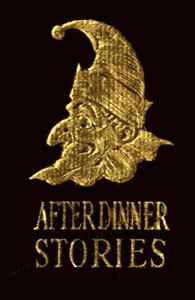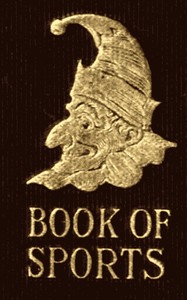Mr. Punch's After-Dinner Stories, J. A. Hammerton and John Leech [carter reed .TXT] 📗

- Author: J. A. Hammerton and John Leech
Book online «Mr. Punch's After-Dinner Stories, J. A. Hammerton and John Leech [carter reed .TXT] 📗». Author J. A. Hammerton and John Leech
 PUNCH LIBRARY OF HUMOUR
[Pg i]
Edited by J. A. Hammerton
PUNCH LIBRARY OF HUMOUR
[Pg i]
Edited by J. A. Hammerton
Designed to provide in a series of
volumes, each complete in itself,
the cream of our national humour,
contributed by the masters of
comic draughtsmanship and the
leading wits of the age to "Punch,"
from its beginning in 1841 to the
present day
 [Pg ii]
[Pg ii]

Progress.—"I maintain that the race has improved in physique since those days. Now we couldn't get into that armour!"
[Pg iii] MR. PUNCH'SAFTER-DINNER STORIES WITH 155
ILLUSTRATIONS BY JOHN LEECH,
CHARLES KEENE,
GEORGE DU MAURIER,
PHIL MAY,
L. RAVEN-HILL,
J. BERNARD PARTRIDGE,
F. H. TOWNSEND,
REGINALD CLEAVER,
LEWIS BAUMER,
A. S. BOYD,
TOM WILKINSON,
G. D. ARMOUR,
AND OTHERS
 PUBLISHED BY ARRANGEMENT WITH
THE PROPRIETORS OF "PUNCH"
THE EDUCATIONAL BOOK CO. LTD.
[Pg iv]
The Punch Library of Humour
Twenty-five volumes, crown 8vo, 192 pages fully illustrated
PUBLISHED BY ARRANGEMENT WITH
THE PROPRIETORS OF "PUNCH"
THE EDUCATIONAL BOOK CO. LTD.
[Pg iv]
The Punch Library of Humour
Twenty-five volumes, crown 8vo, 192 pages fully illustrated
COUNTRY LIFE
IN THE HIGHLANDS
SCOTTISH HUMOUR
IRISH HUMOUR
COCKNEY HUMOUR
IN SOCIETY
AFTER DINNER STORIES
IN BOHEMIA
AT THE PLAY
MR. PUNCH AT HOME
ON THE CONTINONG
RAILWAY BOOK
AT THE SEASIDE
MR. PUNCH AFLOAT
IN THE HUNTING FIELD
MR. PUNCH ON TOUR
WITH ROD AND GUN
MR. PUNCH AWHEEL
BOOK OF SPORTS
GOLF STORIES
IN WIG AND GOWN
ON THE WARPATH
BOOK OF LOVE
WITH THE CHILDREN
 [Pg 5]
POST-PRANDIAL WIT
[Pg 5]
POST-PRANDIAL WIT

There is a sense, of course, in which everything from the pages of Mr. Punch might be regarded as coming into a collection entitled "After Dinner Stories." All good stories are really for telling after dinner. Somehow or other one seldom associates wit and humour with the breakfast table, although the celebrated breakfast parties of Rogers, the banker, were doubtless in no way deficient in either. Over the walnuts and wine, when men have feasted well and are feeling on the best of terms with themselves and their fellows, the cares of the day put past and the pleasures of the gas-lit hours begun, that is undoubtedly the ideal time for the flow of wit.
It must not, therefore, be thought that the present volume is in anywise distinguished from the others of the series to which it belongs in the appropriateness of its contents for the dinner party. No more than any of its companions is it designed to that end; but as it is concerned almost exclusively with the humours of dining, with stories of diners, it will be admitted that its title is not without justification. Private dinner parties, public banquets, the solitary dinner at the restaurant, the giving and accepting of invitations, these and many other phases of dining come within its scope, and if it be noticed that a considerable amount of its humour has something of the fragrance of good old port—to say nothing of the aroma of wines that are[Pg 6] bad!—it can only be retorted that Mr. Punch's duty has ever been to mirror the manners of the changing time, and in his early days the wine flowed more freely than it does to-day. For our personal taste we could have wished less of this humour of the bottle, but throughout this library an effort has been made to maintain in some degree a historical perspective, so that, in addition to the prime purpose of entertainment, each of these books in Mr. Punch's Library might be a faithful picture of the manners of the Victorian period in which most of his life has been passed. If to-day these manners seem to us just a trifle coarser than we esteem the social habits of our own day, surely that is a comforting reflection and one not lightly to be lost!
 [Pg 7]
MR. PUNCH'S
[Pg 7]
MR. PUNCH'SAFTER-DINNER STORIES

Mrs. Jones. And pray, Mr. Jones, what is the matter now?
Jones. I was only wondering, my dear, where you might have bought this fish.
Mrs. Jones. At the fishmonger's. Where do you suppose I bought it?
Jones. Well, I thought that, perhaps, there might have been a remnant sale at the Royal Aquarium!
 Excuse for Drinking before Dinner.—To whet the appetite.
Excuse for Drinking before Dinner.—To whet the appetite.
[Pg 8]

Voice from above. "What are you doing down there, Parkins?"
Parkins. "I'm jush—puttin' away the port, shir!"
[Pg 9]

Commissionaire. "Would you like a four-wheeler or a 'ansom sir?" Convivial Party (indistinctly). "Ver' mush oblige—but—reely don't think I could take 'ny more!"
[Pg 10] RICE AND PRUNESRice and prunes a household journal
Called the chief of household boons;
Hence my mother cooks diurnal
Rice and prunes.
Therefore on successive noons,
Sombre fruit and snowy kernel
Woo reluctant forks and spoons.
As the ear, when leaves are vernal,
Wearies of the blackbird's tunes,
So we weary of eternal
Rice and prunes.
 Never Speak in a Hurry
Never Speak in a Hurry
The Hospitable Jones. Yes, we're in the same old place, where you dined with us last year. By the bye, old man, I wish you and your wife would come and take pot-luck with us again on the——
The Impulsive Brown (in the eagerness of his determination never again to take pot-luck with the Joneses). My dear fellow! So sorry! But we're engaged on the—a—on the—er—on th-th-that evening!
Poor Jones (pathetically). Well, old man, you might have given me time just to name the day.
[Pg 11] "WHO PAYS THE PIPER CALLS THE TUNE"
"WHO PAYS THE PIPER CALLS THE TUNE"
Johnnie (to waiter). "Aw—you're the boss—head waiter, eh?"
Waiter. "Yessir."
Johnnie. "Ah, well, just—ah—send up to your orchestra chaps, and tell 'em I really can't eat my dinner to that tune."
[Pg 12]
A Last Resource.—A happy and independent bachelor finds himself suddenly disappointed of his Christmas party in the country; he has ordered nothing at home, has given his cook and man-servant leave to invite their friends; his intimate companions are out of town, and, on arriving at his club, he is informed by the hall porter that "there is no dinner to-night, as the servants are having a party." Only one resource, a hotel, or dinner at a restaurant, all alone!
[Pg 13]
The very Latest Discovery.—Amateur Astronomical Student (returning home, after attending scientific bachelor dinner, where "the reported discovery of a new Satellite of Saturn" has been warmly discussed). "Where am I? Letsh shee—(considering)—Earth's got one moon. Mars's got five moo—Jup'tush nine—I shee two moons. Then—where am I?"
[Pg 14]
 EFFECT OF GOOD CHEER ON OPPOSITE TEMPERAMENTS
Aspect of Jones and Smith at two different stages of the same sumptuous repast.
EFFECT OF GOOD CHEER ON OPPOSITE TEMPERAMENTS
Aspect of Jones and Smith at two different stages of the same sumptuous repast.
[Pg 15] [Pg 16] At the Celestial Restaurant
Customer (indignantly). Hi! waiter, what do you call this soup?
Waiter (meekly). I not know, sir, but ze padrone tell me to describe 'im cocks-tail!
 "The Coming Man."—A waiter.
"The Coming Man."—A waiter.
[Pg 17]

So very Conscientious!—Master of the House. "Why, Jenkins, what on earth is the matter with you? Aren't you ashamed of yourself?"
Butler (with great deliberation), "Well, shir—if you pleashe, shir—itsh not quite my fault. You told me to taste every bottle of wine before dinner, in cashe one should be corked. I've only carried out in-shtrucshuns."
[Pg 18] THE VERB TO DINE Present TenseI dine.
Thou joinest me.
He tries to whip us up for a division.
We smoke our cigars.
Ye drink your port.
They are defeated in the lobby.
Imperfect TenseI was dining.
Thou wast holding a reception.
He was attending it.
We were feeling puzzled.
Ye were reading the Globe and Pall Mall.
They were not knowing what to make of it.
[Pg 20] Future TenseI shall dine.
Thou wilt join my party.
He will squirm.
We shall promote the unity of the party.
Ye will applaud.
They will call a meeting at the "Reform."
Perfect TenseI have dined.
Thou hast made ambiguous remarks.
He has explained them away.
We have tried to make it all sweet again.
Ye have split a soda.
They have split the party.
Subjunctive PresentI may dine.
Thou mayest object.
He may want to state his views.
We may insist on our dinners.
Ye may agree with them.
They may disagree with you.
[Pg 22] Subjunctive ImperfectI might dine.
Thou mightest emerge from Berkeley Square.
He might resign.
We might lead.
Ye might follow.
They might not.
ImperativeDine thou!
Let him speak out!
Let us know who is our leader!
Read ye the Times and Globe!
Let them settle the question for us!
InfinitivePresent: To split.
Past: To have been a party.

After-Dinner Consideration.—"Hippopotamuses" is a better test-word of fitness for joining the ladies than "British Constitution."
[Pg 19] DISCUSSING AN ABSENT FRIEND
DISCUSSING AN ABSENT FRIEND
"Yes, Robinson's a clever feller, and he's a modest feller, and he's a honest feller; but, betwixt you and I and the post, Mr. Jones," said Brown, confidentially, picking his wisdom tooth with his little finger nail, "Robinson ain't got neither the looks, nor yet the language, nor yet the manners of a gentleman!"
"Right you are, sir!" said Jones, shovelling the melted remains of his ice pudding into his mouth with a steel knife (which he afterwards wiped on the tablecloth). "You've 'it 'im orf to a T!"
[Pg 21]
First Convivial. "'Sh two o'clock! Wha'll er misshus shay?"
Second Convivial. "Thash allri'! Shay you bin wi' me—(hic)!"
[Pg 23] "IN CONFIDENCE"
Dining-room, Apelles Club
"IN CONFIDENCE"
Dining-room, Apelles Club
Diner. "Thomson, do the members ask for this wine?"
Head Waiter (sotto voce). "Not twice, sir!"
[Pg 24] SPECIMENS OF MR. PUNCH'S SIGNATURES! (Fac-similes taken during the course of the evening.) This is before Dinner, 7·30.
This is before Dinner, 7·30.Attested by Several Witnesses.
 This is after the Punch à la Romaine,
This is after the Punch à la Romaine,about the Middle of the Banquet.
 This is with the Dessert.
This is with the Dessert.
 After the Claret.
[Pg 25]
After the Claret.
[Pg 25]
 After the Claret and the Port.
After the Claret and the Port.
 During the Cigars, Whiskey and Water.
During the Cigars, Whiskey and Water.
 12·30. Before leaving Table.
12·30. Before leaving Table.
 1·30. Before getting into Bed.
1·30. Before getting into Bed.
The above have been submitted





Comments (0)